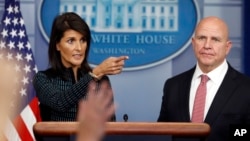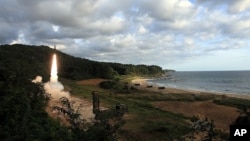President Donald Trump will push the case for tightening the global economic isolation of North Korea at next week’s U.N. General Assembly meeting, according to two senior officials who say he will argue that the failure of diplomacy increases the likelihood of war.
At a White House briefing Friday, Washington’s U.N. ambassador Nikki Haley and National Security Advisor H.R. McMaster welcomed the Security Council’s move this month to place additional sanctions on North Korea, but said Pyongyang’s belligerent behavior is continuing.
“What we’re seeing is that they continue to be provocative, they continue to be reckless,” Haley said. “There is not a whole lot the Security Council is going to be able to do from here, when you cut 90 percent of the trade and 30 percent of the oil. So, having said that, I have no problem kicking it to (Defense Secretary) General (James) Mattis, because I think he has plenty of options.”
McMaster said global support for diplomacy backed by rigorous enforcement of sanctions is needed to avoid what he called “the military option.”
“What we have to do is call on all nations, call on everyone to do everything we can to address this global problem short of war,” McMaster told reporters.
Missile test
North Korea fired a missile Friday over Japan, its second launch over the country since Trump threatened in August to unleash “fire and fury” against Pyongyang if acts of aggression continued. The latest launch has further raised alarm globally over North Korea’s developing nuclear and missile programs.
Trump’s first presidential trip to the United Nations will be as the head of an unusually high-level delegation, including Vice President Mike Pence, Secretary of State Rex Tillerson and other senior officials.
His four-day agenda begins Monday when he hosts a meeting on reforming the world body, something close to his heart. Officials say 120 of the nearly 200 UN member states will attend.
Ambassador Haley said his General Assembly address Tuesday would cover a variety of vexing challenges facing the global community.
“There is no shortage of issues, with North Korea being front and center,” Haley said. “Iran will be an issue, Syria will certainly be talked about, terrorism efforts and how we counter that will be a huge topic, and obviously the humanitarian issues we face around the world.”
Harry Kazianis, director of defense studies at the Center for the National Interest in Washington, said Trump should use his General Assembly speech to increase pressure on China to do more to rein in North Korea’s provocative actions.
“He should explain that if they continue to look the other way when it comes to Kim Jong Un’s acts of aggression, America will start sanctioning parties in China that are making the problem worse. And that means Chinese banks for starters,” Kazianis told VOA.
Critical opportunity
Zalmay Khalilzad, who served as Washington’s U.N. ambassador under former President George W. Bush, said Trump’s General Assembly speech is a crucial opportunity to reassure the world that his foreign policy is based primarily on the soft power of diplomacy rather than military might.
“The world is concerned that our current president may be de-emphasizing America’s soft power and the values America has traditionally been seen to stand for, and he may be more interested in hard power,” Khalilzad said in an interview. “His speech to the General Assembly provides a great opportunity to set the record straight.”
Trump has made no secret of his disdain for the United Nations during his relatively short career in politics. He once describing the world body as “a club for people to get together, talk and have a good time.”
Jon Alterman, director of the Middle East program and senior vice president at the Center for Strategic and International Studies in Washington, said that while the General Assembly debate may appeal to Trump’s desire to have the world’s attention, the forum does not suit his negotiating style.
“It’s the world’s most tedious cocktail party,” Alterman told a press conference call Friday. “It isn’t the way he (Trump) likes to operate. I think he likes working the room, and he likes unwinding with people, but this is a lot of very structured meetings.
“This is not the kind of environment he likes, but this is the kind of environment the U.S. president has to plunge into once a year,” Alterman said.
Nevertheless, the president’s schedule includes a long list of one-on-one meetings with other leaders. He will not, however, see either Russian President Vladimir Putin or Chinese President Xi Jinping, neither of whom is attending the annual gathering.






